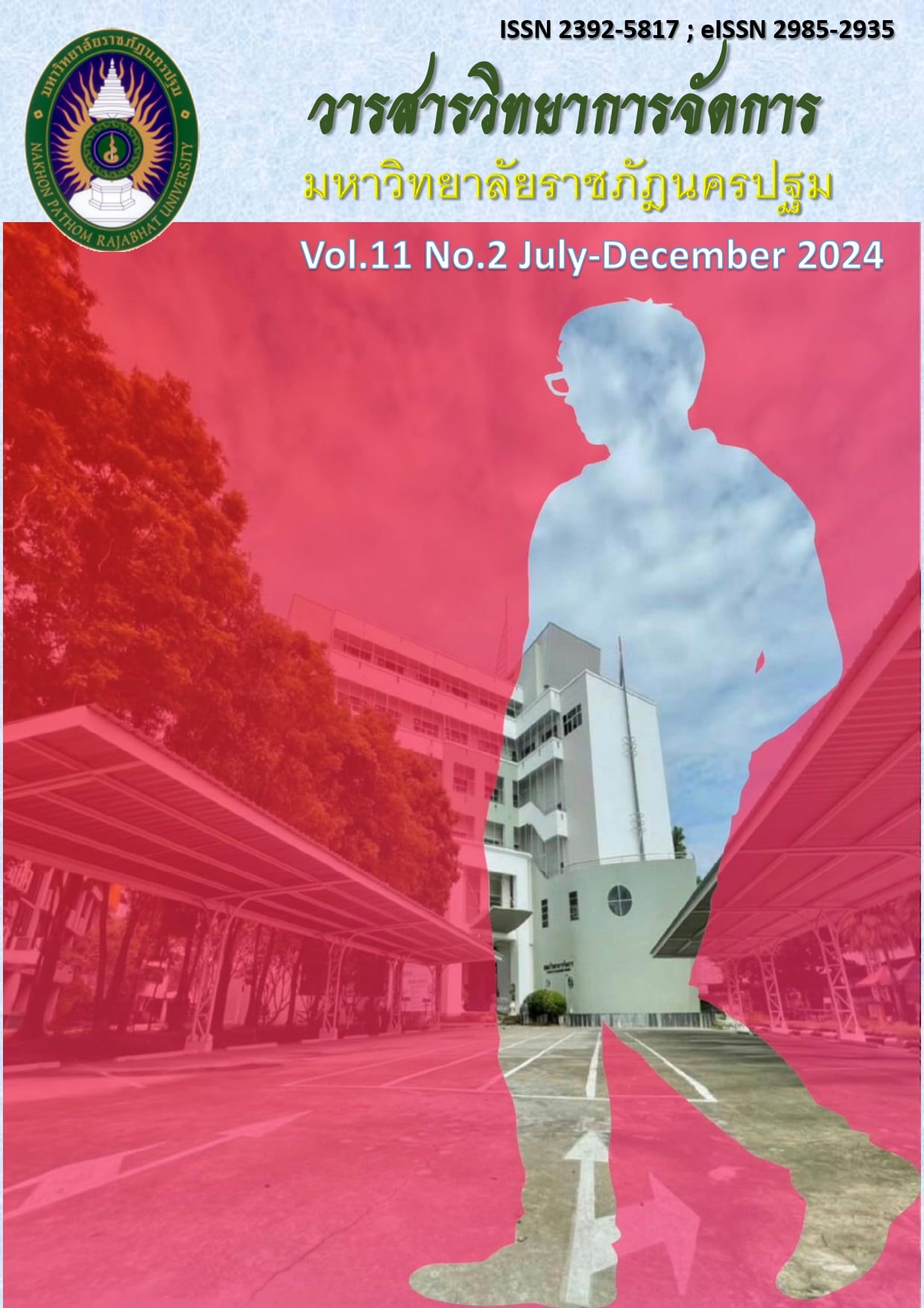การจัดการทุนมนุษย์เชิงกลยุทธ์เพื่อประสิทธิภาพขององค์การในอุตสาหกรรมอีสปอร์ต Strategic Human Capital Management for Efficiency of Organization in the Esports Industry
Main Article Content
Abstract
This study investigates to 1) the influence of strategic human capital management on organizational efficiency in the esports industry and 2) the impact of work commitment and organizational efficiency on the overall performance within this context. The sample group consisted of 273 entrepreneurs and senior executives, selected through purposive sampling. Structural equation modeling (SEM) was used for statistical analysis.
The findings underscore the critical role of strategic human capital management in fostering sustainable competitive advantages within the esports industry. Organizations that prioritized personnel development demonstrated significantly enhanced performance metrics. Comprehensive personnel development significantly enhances employee performance and morale, emphasizing the importance of supportive work environments in driving organizational productivity. Strategic human capital management emerged as a key driver of organizational efficiency and sustainable outcomes in the esports industry, reinforcing the notion that effective human capital management and strategies contribute significantly to an organization's long-term success.
Article history: Received 20 August 2024
Revised 13 October 2024
Accepted 15 October 2024
SIMILARITY INDEX = 0.00 %
Article Details

This work is licensed under a Creative Commons Attribution-NonCommercial-NoDerivatives 4.0 International License.
The views and opinions of the article appearing in this journal are those of the author. It is not considered a view and responsibility of the editorial staff.
References
Agag, G., and El-Masry, A. A. (2016). Understanding consumer intention to participate in online travel community and effects on consumer intention to purchase travel online and WOM: An integration of innovation diffusion theory and TAM with trust. Computers in Human Behavior, 60, 97-111. http://doi:10.1016/j.chb.2016.02.038
Allal-Chérif, O., Guaita-Martínez, J. M., and Montesinos Sansaloni, E. (2024). Sustainable esports entrepreneurs in emerging countries: Audacity, resourcefulness, innovation, transmission, and resilience in adversity. Journal of Business Research, 171. 114382. doi:10.1016/j.jbusres.2023.114382
Alo, O., Ali, I., Zahoor, N., Arslan, A., and Golgeci, I. (2023). Impression management and leadership in failing or failed business-to-business firms during and post-COVID-19: Empirical insights from Africa. Industrial Marketing Management, 113, 1-13. http://doi:10.1016/j.indmarman.2023.05.018
Ambatali, C. D., and Verspieren, Q. (2024). Human resource development and management in the Philippines’ national space capacity building program. Advances in Space Research, 73(1), 1031-1040. http://doi:10.1016/j.asr.2023.10.030
Babin, J. J., Chauhan, H. S., and Kistler, S. L. (2024). When pretty hurts: Beauty premia and penalties in eSports. Journal of Economic Behavior and Organization, 217, 726-741. http://doi:10.1016/j.jebo.2023.12.002
Chen, J., and Wu, Y. (2024). Would you be willing to purchase virtual gifts during esports live streams? Streamer characteristics and cultural traits. Computers in Human Behavior, 152.108075. http://doi:10.1016/j.chb.2023.108075
Dieste, M., Sauer, P. C., and Orzes, G. (2022). Organizational tensions in industry 4.0 implementation: A paradox theory approach. International Journal of Production Economics, 251. 108532. http://doi:10.1016/j.ijpe.2022.108532
Jordan-Vallverdú, V., Plaza-Navas, M.-A., Maria Raya, J., and Torres-Pruñonosa, J. (2024). The Intellectual Structure of Esports Research. Entertainment Computing, 49. 100628 http://doi:10.1016/j.entcom.2023.100628
Ke, X., and Wagner, C. (2024). What explains the next level of gaming? An experience-anticipation model for amateur esports participation. Computers in Human Behavior, 153. 108125 http://doi:10.1016/j.chb.2023.108125
Kopaneli, A. (2014). Finance, Marketing, Management and Strategy Planning. A Qualitative Research Method Analysis of Case Studies in Business Hotels in Patras and in Athens. Procedia Economics and Finance, 9, 472-487. http://doi:10.1016/s2212-5671(14)00049-5
Liu, Y., and Ossareh, H. R. (2021). Preview Reference Governors: A constraint management technique for systems with preview information. Systems and Control Letters, 152. 104932http://doi:10.1016/j.sysconle.2021.104932
López-Cabarcos, M. Á., Caby, J., Lugilde, S. A. S., and Piñeiro-Chousa, J. (2024). An approach to innovative eSports from a business perspective. Journal of Innovation and Knowledge, 9(4). 100555 http://doi:10.1016/j.jik.2024.100555
McLinton, S. S., and Pascale, S. J. (2024). Tilt in esports: Understanding the phenomenon in new digital contexts. Computers in Human Behavior Reports, 14. 100425http://doi:10.1016/j.chbr.2024.100425
Minami, S., Koyama, H., Watanabe, K., Saijo, N., and Kashino, M. (2024). Prediction of esports competition outcomes using EEG data from expert players. Computers in Human Behavior, 160.108351 http://doi:10.1016/j.chb.2024.108351
Paiola, M., and Gebauer, H. (2020). Internet of things technologies, digital servitization and business model innovation in BtoB manufacturing firms. Industrial Marketing Management, 89, 245-264. http://doi:10.1016/j.indmarman.2020.03.009
Zhou, D., Kautonen, M., Dai, W., and Zhang, H. (2021). Exploring how digitalization influences incumbents in financial services: The role of entrepreneurial orientation, firm assets, and organizational legitimacy. Technological Forecasting and Social Change, 173. .121120 http://doi:10.1016/j.techfore.2021.121120

